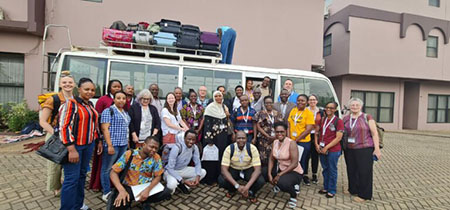Craniofacial Experts from Seattle Children’s Make Global Impact for Kids with Cleft Lip and Palate
4.18.2023 | Ashley Speller
 Every year, Seattle Children’s Craniofacial Center treats hundreds of children with craniofacial conditions and rare syndromes. Cleft lip and cleft palate are among the most common kinds of birth defects in the United States, and affects more than 1 in 1000 newborns around the world.
Every year, Seattle Children’s Craniofacial Center treats hundreds of children with craniofacial conditions and rare syndromes. Cleft lip and cleft palate are among the most common kinds of birth defects in the United States, and affects more than 1 in 1000 newborns around the world.
The lip and palate (roof of mouth) form in early pregnancy. Cleft lip is a separation of the two sides of the upper lip and a cleft palate is an opening in the roof of the mouth that occurs when the two sides of the palate do not bond together. A cleft palate can impact a child’s ability to speak, swallow and sometimes hear properly.
“A cleft lip and a cleft palate can lead to feeding problems, so there can be difficulties gaining weight,” explained Dr. Anne Hing, a pediatrician in Seattle Children’s Division of Craniofacial Medicine and Genetics Clinic. “Babies with a cleft of the palate cannot create the suction necessary to feed at the breast, which is their main source of nutrition.”
As the most common condition treated in Seattle Children’s Craniofacial Center, its experts are looked at locally, regionally and internationally to provide their unique expertise and support in cleft lip and palate care.
“Children will not only need surgical intervention, but also need to be seen by a number of providers in other disciplines including pediatricians, nurses, speech and language pathologists, nutritionists, orthodontists and social workers,” added Seattle Children’s director of Plastic Surgery Education Dr. Craig Birgfeld, who specializes in the surgical treatment of craniofacial disorders.
In an effort to improve and expand access to cleft lip and palate care beyond its hospital walls, Dr. Michael Cunningham, Medical Director of Seattle Children’s Craniofacial Center, and Dr. Richard Hopper, the Center’s Surgical Director, partnered with physicians from sub-Saharan Africa to establish a sustainable program dedicated to training regional medical providers on how to provide team care for children with cleft lip and palate.
The challenges children and families in sub-Saharan Africa encounter are substantial and include access to early feeding support, surgery, speech therapy, and team care, often travelling long distances at great cost and risk. Medical providers face infrastructure and equipment challenges, in addition to a lack of medical care and shortage of surgeons. All of these factors can cause a cascade of complications for newborns, including malnutrition, social isolation, and premature death.
Partners in African Cleft Training (PACT) is a hands-on learning program that has been going strong for over 15 years and has helped train healthcare providers in Ghana, Ethiopia, Nigeria, Senegal, Cote d’Ivoire, Tanzania, Liberia, and Kenya.
PACT emphasizes the same interdisciplinary approach used at Seattle Children’s Craniofacial Center and has received international praise for its effectiveness and quality of care.
“The goal is to improve patient outcomes by caring for the whole child through the idea of interdisciplinary team care,” said Dr. Hing. “We are helping others learn how to become self-sustaining in treating children with cleft lip and palate.”
In 2023, during their trip in Kumasi, the craniofacial team of seven partnered with nearly 60 cleft team providers from other countries for the five-day PACT workshop comprised of group lectures, breakout sessions, subspeciality teaching sessions, clinics, pre-surgical discussions, two full days of pediatric cleft lip or palate repair surgeries, and post-operative assessments.
Participants learned, asked questions, and discussed how to support and improve team care at their respective centers. Many also shared their experiences in providing care for patients despite overwhelming challenges.
The Craniofacial Center team continues to hold quarterly virtual seminars and have established a virtual classroom with learner modules, lectures, and resources for cleft team care. They hope to hold another workshop in 2024 to carry on this impactful work.
To help support PACT and further the program’s global impact on children with cleft lip and palate, visit give.seattlechildrens.org and designate donations to the ‘Partners in African Cleft Training Fund.’